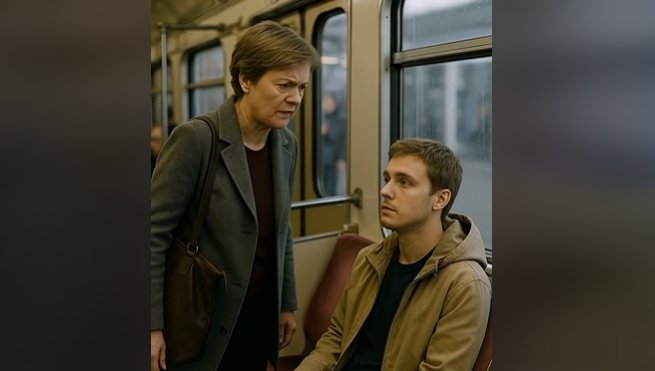Another stop. The train doors slid open with a sigh, and passengers spilled in like water rushing through a dam. It was rush hour, and the cabin was filled with weary faces, rustling bags, and umbrella tips poking into people’s sides.
A woman stepped in, maybe fifty, dressed like she wanted to be noticed. Her heels clicked confidently on the train floor, her long gray coat swished behind her, and her lipstick gleamed like armor. Her eyes scanned the cabin, annoyed. Irritated by existence itself.
She brushed past a young man sitting near the door. He was around twenty-five, in a hoodie, his legs slightly out in the aisle, headphones in, gaze on the floor. She didn’t ask politely. She didn’t say excuse me. But she paused, looked back, and decided that this was her moment.
“Didn’t they teach you to give way to old people?!” she snapped, her voice sharp as broken glass.
The boy blinked, pulled one earbud out, and looked at her with unsettling calm.
“I’m talking to you!” she barked again, louder. “Is it so hard to give up your seat to a woman? Or do you think the world revolves around you?”
The carriage went still. Commuters shifted in their seats, pretending not to watch while watching everything. The script was writing itself—public shame, yelling, maybe even someone filming.
But instead of clapping back, the young man slowly stood up.
Then—he dropped to one knee.
A collective gasp rippled through the subway car.
From his hoodie pocket, he pulled out a tiny velvet box. Opened it. Inside wasn’t a ring, but a simple pin—a golden sunflower.
“This belonged to my mother,” he said, his voice soft, trembling a little. “She passed away exactly one year ago today. On this very train line. She used to give away little sunflowers like this to people who looked tired or angry. Said the world needed small sunshine.”
He gently held the pin toward the woman. “You looked like you could use one.”
The woman’s mouth parted, but no sound came. Her eyes flickered with confusion, embarrassment—and something else. Vulnerability.
No one said a word. Even the rumble of the train seemed distant.
The woman slowly reached out and took the pin. Her hand was shaking. She whispered, “Thank you…”
The young man stood, nodded once, then moved to the door as the train pulled into the next station.
He didn’t say another word.
But the entire carriage seemed warmer somehow.
As if that small act—unexpected, disarming, deeply human—had reminded everyone that sometimes, kindness cuts deeper than any argument.
